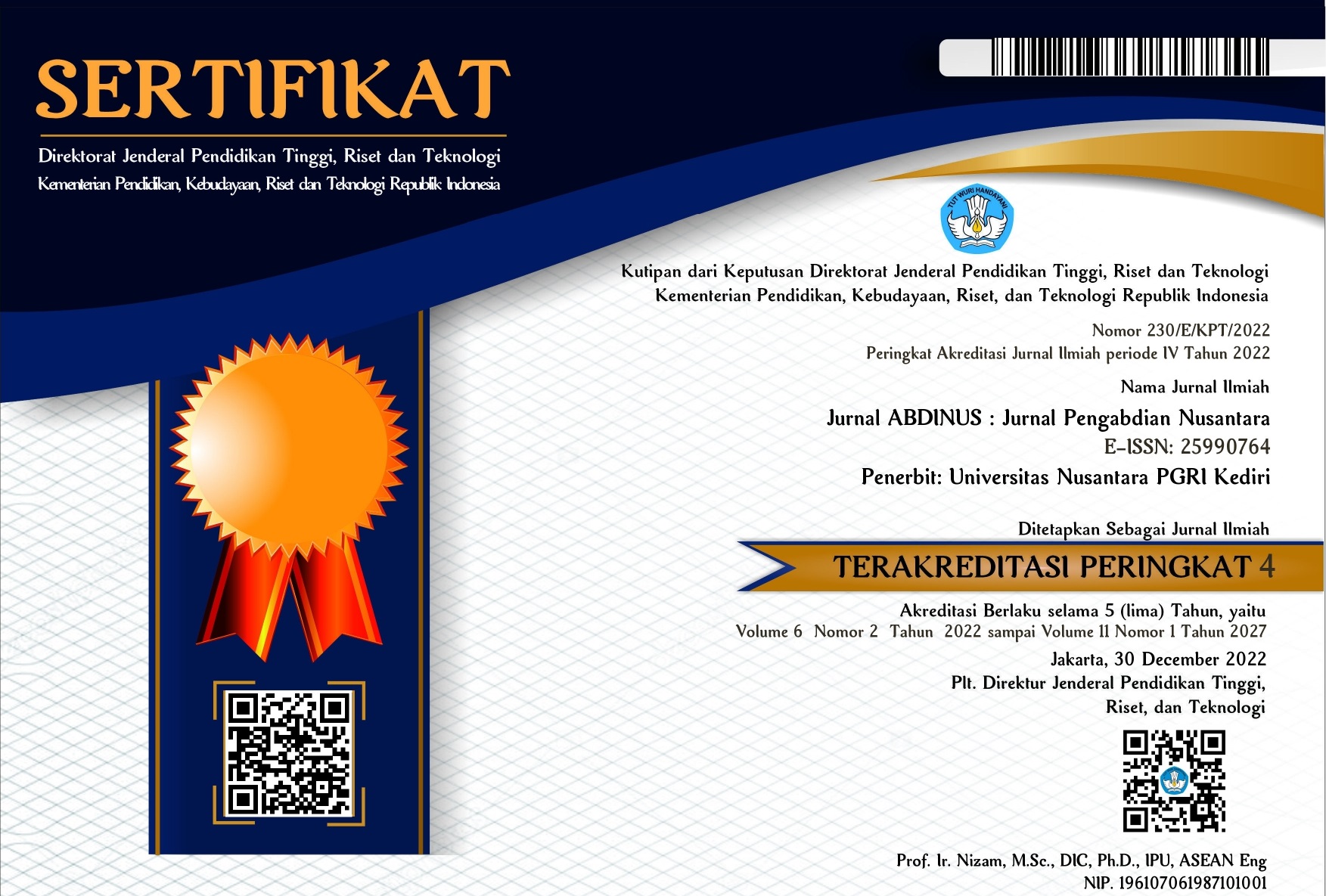Kegiatan IBM Goes to School Meningkatkan Pengetahuan Kewirausahaan pada Siswa SMA Tri Karya Surabaya
DOI:
https://doi.org/10.29407/ja.v7i3.19383Keywords:
Training, Entrepreneurship, Business, Bird in HandAbstract
Tri Karya High School provides theoretical entrepreneurship or entrepreneurship learning. The impact of the theoretical learning of Tri Karya SMA students is that they are not confident and have low ability to explore business potential in themselves. This is because entrepreneurship or entrepreneurship subjects are not equipped with the effective bird-in-hand concept. The IBM Goes to School activity provides entrepreneurship training with the effective bird in hand concept. The training methods are in the form of presentation, question and answer sessions, group discussions, practice, and reflection. The result of the IBM Goes to School activity by using the effective bird in hand concept can maximize the quality of entrepreneurship or entrepreneurship learning for Tri Karya High School students. Tri Karya High School students become confident, able to arrange bird in hand from national/international entrepreneurs as well as individual bird in hand. The IBM Goes to School activity also provides entrepreneurship or entrepreneurship learning innovations in the form of practical methods and interactive discussions.
Downloads
References
Abdika, Y., Arham, M. A., & Sudirman, S. (2019). Pengaruh Metode Tanya Jawab Terhadap Hasil Belajar Siswa. Jambura Economic Education Journal, 1(2), 88–98. https://doi.org/10.37479/jeej.v1i2.2522
Angelo, H. (2013). Bird in hand: How experience makes nature. Theory and society, 42, 351-368.
Br Sitepu, S. N. (2021). Pendidikan Entrepreneurship bagi Pengelola Badan Usaha Milik Desa (BUMDes) Mugibangkit. Abdimas: Jurnal Pengabdian Masyarakat Universitas Merdeka Malang, 6(2), 260–270. https://doi.org/10.26905/abdimas.v6i2.5121
Fourqoniah, F., & Christiana, A. (2019). Refleksi Pendidikan Kewirausahaan: Sudahkan Mampu Meningkatkan Minat Dan Keterampilan Berwirausaha Mahasiswa (Studi Pada Program Studi Adminsitrasi …. Proceeding Indonesian Carrier …, 17–18. http://e-journals.unmul.ac.id/index.php/ICCN/article/view/3118
Hasan, H. A. (2020). Pendidikan kewirausahaan: Konsep, karakteristik dan Implikasi dalam Memandirikan generasi Muda. PILAR, 11(1).
Junedi, B., Isa, I. G. T., Baqi, F. A., Hidayat, A., Surtini, S., & Laela, I. (2022). Pendampingan Kapasitas Siswa melalui Budaya Entrepreneurship di Koperasi Siswa di MA Al Khairiyah Pipitan. Jurnal Inovasi Pengabdian Dan Pemberdayaan Masyarakat, 2(1), 39–50. https://doi.org/10.54082/jippm.18
Junita, J., & Siregar, M. (2018). Penerapan Metode Pembelajaran Diskusi dalam Peningkatan Prestasi Belajar pada Kompetensi Dasar Menjelaskan Makna Kedaulatan Rakyat Siswa Kelas VIII SMP Negeri 2 Kota Pinang Kabupaten Labuhanbatu Selatan Tahun Pelajaran 2014/2015. Civitas (Jurnal Pembelajaran Dan Ilmu Civic), 4(1), 36-45.
Kuat, T. (2016). Penumbuhan Jiwa Kewirausahaan Melalui Praktik Bisnis di Business Center (Studi Kasus: SMK Muhammadiyah 2 Surakarta). Jurnal Pendidikan Ilmu Sosial, 25(1), 155–168. http://journals.ums.ac.id/index.php/jpis/article/view/827
Nisa, S., & Komara, B. D. (2022). Efektifitas Metode Efektuasi, Metode Design Thinking Dan Bisnis Model Kanvas Untuk Meningkatkan Kualitas Kewirausahaan Di Tengah Pandemi Covid-19. Proceeding Umsurabaya, 1(1).
Prijanto, J. H., & Kock, F. De. (2021). Peran Guru Dalam Upaya Meningkatkan Keaktifan Siswa Dengan Menerapkan Metode Tanya Jawab Pada Pembelajaran Online. Scholaria: Jurnal Pendidikan Dan Kebudayaan, 11(3), 238–251.
Purworini, D. (2018). Pembentukan Harga Diri: Analisis Presentasi Diri Pelajar SMA di Media Sosial. Jurnal Komunikasi, 10(1), 33-47.
Pono, N., & Lutfi, M. (2012). Pengaruh Pembelajaran Menggunakan Metode Diskusi Kelompok Terhadap Prestasi Belajar Siswa Pada Pokok Bahasan Geometri Dimensi Tiga Di Man Kalimukti Kec. Pabedilan Kab. Cirebon. Neliti. Retrieved December 3, 2022, from https://www.neliti.com/publications/55192/pengaruh-pembelajaran-menggunakan-metode-diskusi-kelompok-terhadap-prestasi-bela
Safitri, D., Lismen, S., Jaya, S. M., Nurmeli, K., Evanita, S., & Friyatmi. (2022). Optimalisasi Entrepreneurship Skills Melalui Simulasi Bisnis. Jurnal Pendidikan Tambusai, 6(2), 11174–11185. https://jptam.org/index.php/jptam/article/view/4120/3522
Setiawati, S. D., Purba, V., Retnasari, M., Fitriawati, D., & Ngare, F. (2018). Membangun Kemampuan Presentasi Bisnis Sebagai Upaya dalam Pengembangan Usaha Mikro Kecil Menengah. Jurnal Abdimas BSI, 1(2), 252–258. https://scholar.google.com/scholar?start=10&=jurnal+komunikasi+bisnis+bentuk+umkm&hl=id&as=0,5#d=gs_qabs&u=%2523p%25DpplyxZQCiPcJ
Sulastri, Adam, M., Saftiana, Y., Nailis, W., & Putri, Y. H. (2022). Pelatihan dan Pendampingan Penyusunan Rencana Bisnis Model Kanvas bagi Usaha Mikro Kecil dan Menengah. Jurnal Masyarakat Mandiri, 6(1), 121–130.
Tahirs, J. P., & Rambulangi, A. C. (2020). Menumbuhkan Minat Berwirausaha Melalui Pelatihan Kewirausahaan Bagi Siswa Smk. Community Development Journal : Jurnal Pengabdian Masyarakat, 1(2), 125–129. https://doi.org/10.31004/cdj.v1i2.741
Werdani, R. E., Kurniawati, N. I., Sukoco, J. B., Windriya, A., & Iskandar, D. (2020). Pelatihan Pemasaran Produk Homemade Melalui Sosial Media. JPPM (Jurnal Pengabdian Dan Pemberdayaan Masyarakat), 4(1), 1. https://doi.org/10.30595/jppm.v4i1.4655















